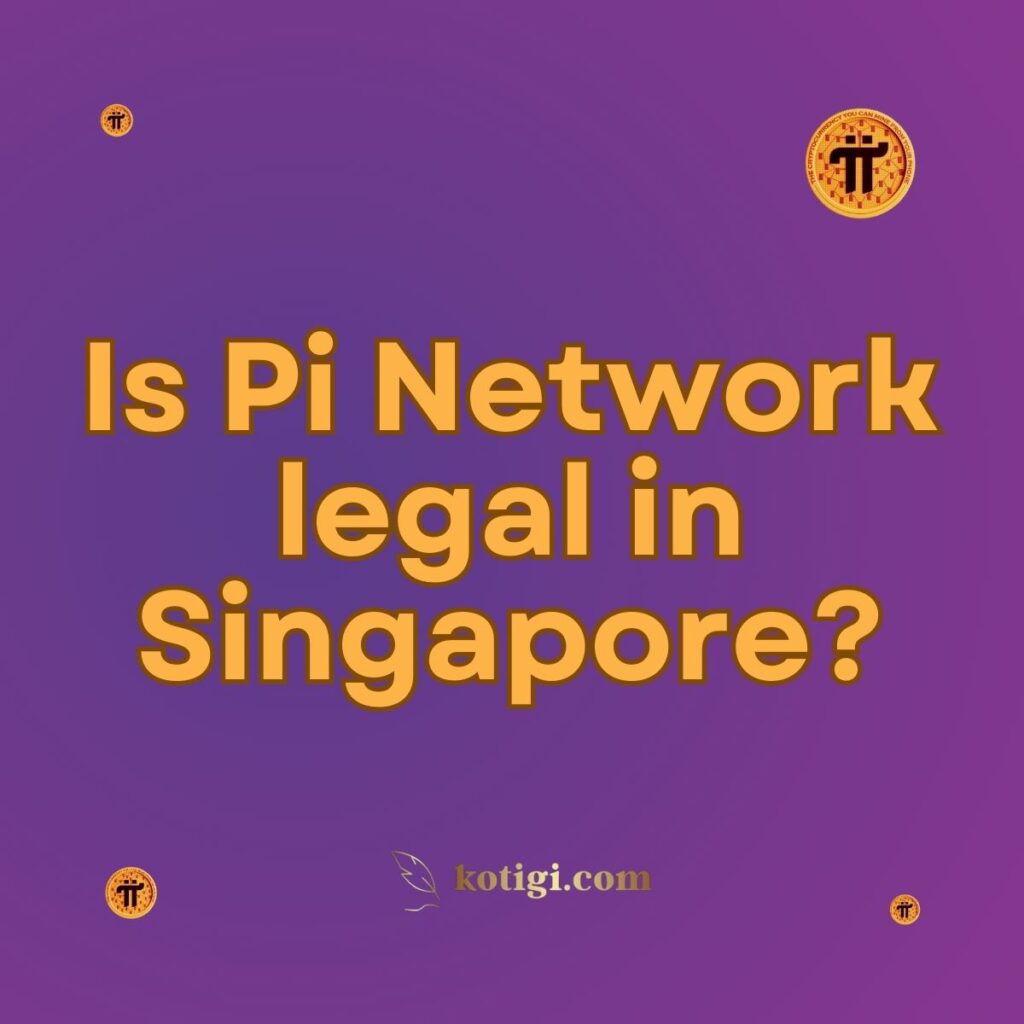
Is Pi Network legal in Singapore?
Pi Network is currently legal in Singapore, where cryptocurrency use is allowed under a well-regulated framework. The Monetary Authority of Singapore (MAS) provides clear guidelines on digital assets, ensuring that users can engage with platforms like Pi Network while adhering to the country’s financial regulations.
Introduction
As a global financial hub, Singapore is known for its forward-thinking approach to digital assets and blockchain technology. With the rise of Pi Network, many Singaporeans are curious about its legal status and whether the platform is compliant with local regulations. In this article, we’ll explore the legality of Pi Network in Singapore, the country’s regulatory framework for cryptocurrencies, and what this means for Pi Network participants.
Cryptocurrency Regulations in Singapore
Regulatory Framework by MAS
The Monetary Authority of Singapore (MAS) oversees the regulation of digital assets, including cryptocurrencies. Singapore’s Payment Services Act (PSA) governs the use of digital payment tokens (DPTs), which includes cryptocurrencies. Platforms like Pi Network must comply with the guidelines laid out by MAS to ensure they operate legally within the country.
As Pi Network functions as a decentralized cryptocurrency, its operations in Singapore are subject to PSA regulations. This includes compliance with anti-money laundering (AML) and countering the financing of terrorism (CFT) measures.
Legal Status of Cryptocurrencies
In Singapore, cryptocurrencies are not banned. They are viewed as digital assets, and their usage is regulated, but not restricted. Users of Pi Network can legally participate in the platform, mine Pi coins, and store them in their wallets. However, it is important to note that Pi Network users must adhere to Singapore’s regulatory requirements regarding taxation and reporting.
The MAS’s approach ensures a balanced environment that supports financial innovation while protecting consumers and maintaining regulatory oversight.
Pi Network’s Place in Singapore’s Cryptocurrency Market
Pi Network’s Compliance with Local Laws
As Pi Network evolves and transitions to its mainnet, compliance with Singapore’s cryptocurrency laws becomes crucial. While the platform is currently operating within the legal framework, any future plans involving token exchanges or trading will require careful adherence to MAS guidelines. Singapore has a robust legal environment for cryptocurrency exchanges, and Pi Network will need to align with local requirements if it seeks to enable coin trading within the country.
Accessibility and Financial Inclusion
One of Pi Network’s key appeals in Singapore is its potential to promote financial inclusion. The platform’s mobile mining model allows individuals from various socioeconomic backgrounds to participate in the cryptocurrency space without needing expensive mining equipment. This aligns with Singapore’s broader goal of encouraging digital innovation and inclusivity in the financial sector.
Key Legal Considerations for Pi Network Users in Singapore
Regulatory Reporting and Taxation
Users of Pi Network in Singapore should be aware of their obligations under local tax laws. While the MAS does not treat cryptocurrencies as legal tender, they are considered assets for tax purposes. Any income or capital gains generated from cryptocurrency activities, including Pi Network, must be reported in tax filings.
As Pi Network matures and its coins become tradeable, participants may be subject to additional tax obligations. It’s important for users to stay updated on local tax guidelines to ensure they comply with all necessary reporting requirements.
Risks in an Evolving Legal Landscape
Although Pi Network is currently legal in Singapore, the cryptocurrency regulatory environment is continuously evolving. The MAS has indicated that it is monitoring the development of digital assets closely and may introduce further regulations as needed. Pi Network users in Singapore should be aware of potential changes that could impact the platform’s operations, particularly as it moves toward its open mainnet phase.
MAS’s Approach to Cryptocurrency Exchanges
Licensing for Exchanges
In Singapore, cryptocurrency exchanges must be licensed under the Payment Services Act (PSA). Pi Network, once it reaches its open mainnet and Pi coins become tradeable, would likely need to partner with or establish a licensed exchange to facilitate the buying and selling of Pi coins. The MAS ensures that exchanges comply with strict AML and CFT regulations, providing a secure environment for users.
Pi Network participants should keep in mind that until Pi coins can be traded, their usage is limited to within the platform, and regulatory requirements will come into play once external trading becomes possible.
Consumer Protection Measures
The MAS emphasizes the importance of consumer protection in the cryptocurrency space. While Pi Network users in Singapore can legally participate in the platform, they should be cautious about the risks associated with using cryptocurrencies, especially in an unregulated phase like Pi Network’s current closed mainnet. The MAS encourages users to conduct thorough research before engaging with any digital asset platform to ensure they understand the risks involved.
The Future of Pi Network in Singapore
Opportunities for Growth
Singapore’s strong regulatory framework presents both challenges and opportunities for Pi Network. The country’s favorable attitude toward fintech innovation means that platforms like Pi Network have room to grow, provided they adhere to local laws. The ongoing development of Pi Network’s infrastructure, coupled with Singapore’s openness to blockchain technology, suggests that the platform could gain traction in the country’s tech-savvy population.
As Singapore continues to develop its blockchain ecosystem, Pi Network could play a role in furthering the adoption of decentralized technologies. The platform’s focus on community participation and its mobile mining model could resonate with Singaporeans interested in low-barrier entry into the cryptocurrency space.
Potential Regulatory Developments
While Pi Network is currently legal in Singapore, users should stay informed about any future regulatory changes. The MAS is known for its proactive stance on digital asset regulation, and new policies could emerge as the cryptocurrency landscape evolves. Users should regularly check for updates from the MAS to ensure they remain compliant with any new legal requirements.
As Pi Network approaches its mainnet phase and its coins become tradeable, the platform will need to navigate Singapore’s regulatory environment carefully. Compliance with licensing, taxation, and consumer protection laws will be essential for the platform’s long-term success in the country.
Conclusion
Pi Network is legal in Singapore, operating within the guidelines established by the Monetary Authority of Singapore (MAS). While the platform currently offers its services without issue, users must remain vigilant about regulatory obligations such as taxation and potential future changes in Singapore’s cryptocurrency laws. As Pi Network transitions to its open mainnet, compliance with MAS regulations will become even more crucial for the platform’s operations in Singapore.
For now, Pi Network participants can enjoy the benefits of mining and accumulating Pi coins within the framework of Singapore’s well-regulated digital asset market.
Key Takeaways
- Legal Status: Pi Network is legal in Singapore, operating under the regulations set forth by the Monetary Authority of Singapore (MAS).
- MAS Regulatory Framework: Cryptocurrency use in Singapore is governed by the Payment Services Act (PSA), ensuring compliance with AML and CFT regulations.
- Tax Obligations: Pi Network users in Singapore must report any income or gains from their cryptocurrency activities for tax purposes.
- Potential Regulatory Changes: While Pi Network is currently compliant, users should stay informed about future legal developments that could affect the platform’s operations.
- Consumer Protections: The MAS emphasizes user safety in the cryptocurrency space, urging Pi Network participants to understand the risks involved in using the platform.





